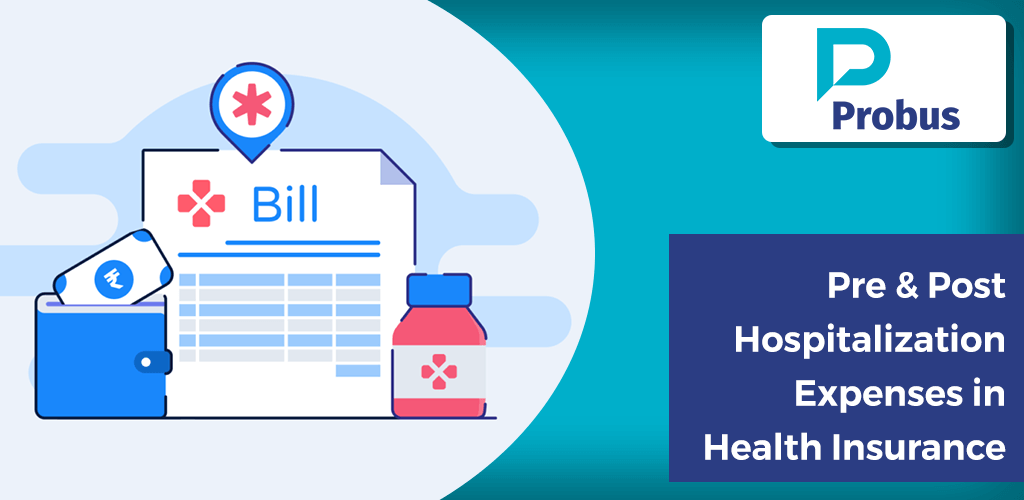An insured person’s health insurance policy serves as a financial safety net. When the insured becomes ill and requires hospitalization for treatment, this coverage comes in useful. You can choose cashless treatments if you have insurance, and you are excluded from paying taxes under section 80 D of the Income Tax Act of 1961.
If your insurance is insufficient, you risk depleting your funds due to the rapidly rising cost of healthcare. Therefore, it is crucial to verify your policy’s pre- and post-hospitalization spending coverage before purchasing a health insurance plan.
Read ahead to know more about pre-hospitalization and post-hospitalization expenses in the health insurance sector.
What Is The Pre-Hospitalization Expense?
Pre-hospitalization fees are the medical expenses incurred before the patient is admitted to the hospital for the same illness. The majority of health insurance plans pay for these expenses 45 to 90 days before the hospitalization.
Pre-hospitalization charges are medical costs incurred before being admitted to a hospital. People typically contact their family doctor or a specialist when they are anxious. To arrive at a specific diagnosis, the doctor might advise undergoing particular tests and scans. The patient gets admitted to the hospital if the diagnosis is serious.
Let’s understand!
On July 23, 2022, let’s say a patient is admitted to the hospital for typhoid treatment. However, the symptoms had to be present for the patient’s first week before the last hospitalization. Pre-hospitalization activities must have included things like doctor visits, diagnostic procedures, prescription medication, etc.
The patient was admitted to the hospital later that week, received care for the following seven days, and was released on July 30, 2022.
What Is The Post-Hospitalization Expense?
All costs or fees a person incurs after being hospitalized are included in post-hospitalization expenses. For instance, the consulting doctor can advise certain tests to gauge a patient’s progress or recuperation. It is significant to note that depending on the type, the number of days covered varies. However, expenditures incurred by a person for 60 days following their discharge often fall under the category of post-hospitalization fees.
Costs incurred following the patient’s hospital discharge are referred to as post-hospitalization costs.
After the patient is released from the hospital, post-hospitalization coverage typically lasts 45 to 90 days. To see the scope of the coverage described, you should carefully study your insurance documentation, though.
Top Reasons To Buy Health Insurance With Pre & Post Hospitalization Coverage
Here is the list of the reasons to buy health insurance with pre and post hospitalziation coverage.
- Wide Network Hospitals
You will be given a list of hospitals to pick from when you choose a health insurance plan that covers pre- and post-hospitalization. With such extensive coverage, you will also be eligible for cashless treatment benefits, which eliminates the need to submit a health insurance claim and wait for bill reimbursement. With pre- and post-hospitalization insurance, you will also have the freedom to select a hospital that is closer to your home, making it simpler for you to resolve your insurance claim.
- Includes Treatment Cost:
Sometimes the expense of a disease’s post-hospitalization care might be more financially taxing than the cost of the initial hospitalization. For instance, a person may spend a week in the hospital receiving treatment for a condition, but ongoing care after discharge may last for months. Surgery, dialysis, day-care treatment, and other types of treatment are frequently covered by post-hospitalization insurance, easing the financial load.
- Superior Coverage:
You can overcome any financial difficulties that may develop from the time the condition is diagnosed until you recover with the aid of a health insurance plan that includes pre- and post-hospitalization coverage. Not all health insurance policies may provide this coverage. So, before purchasing a plan, it is crucial to study the policy’s contents and exclusions to learn more about the coverage.
How To Claim Pre-Hospitalization & Post-Hospitalization Expenses?
When claiming pre-hospitalization and post-hospitalization costs, timing is extremely important. Insurance providers adhere to a certain timeline for handling such claims. For post-hospitalization charges, for instance, the claim application and document submission process must be finished within the allotted period after receiving treatment. Otherwise, it may be disregarded due to noncompliance. Because of this, you must be aware of the deadline for filing such claims and follow it while settling a claim.
Step 1: Make that the therapy claimed for both before and after hospitalization is for the same condition that led to the patient’s admission.
Step 2: Complete the necessary claims and submit them to your insurance and the TPA together with your medical bills and other necessary supporting documentation (see below).
For filing a claim, you need to submit the following documents for verification:
- Original hospital bills
- Discharge summary
- Applicable medical certificates
- Original Prescriptions
- Medicine and drugs bills
- Other supporting documents requested by the insurance company
Step 3: Do not forget to file the claim between 45 and 90 days after the hospital stay. (Ask your insurer about the deadlines for submitting a claim.)
Step 4: Following the submission of the supporting documentation, the insurer will review it and, if they determine that the costs were connected to the same medical issue for which the patient was hospitalized, they will accept the claim.
After the documents are turned in, the claim verification/validation process gets started. The insurer will determine whether the costs are connected to the same medical issue that led to the patient’s admission or not. If the expenses are unrelated, the claim may be rejected. The claim amount will be paid out following the policy’s terms and conditions after verification.
Are Ayurvedic Treatments Covered Under Post-Hospitalization?
Depending on the chosen insurance and the policy, some insurers might pay these costs and others might not. Please review the health insurance policy’s provisions and exclusions to determine whether or not ayurvedic therapies are covered under post-hospitalization charges.








